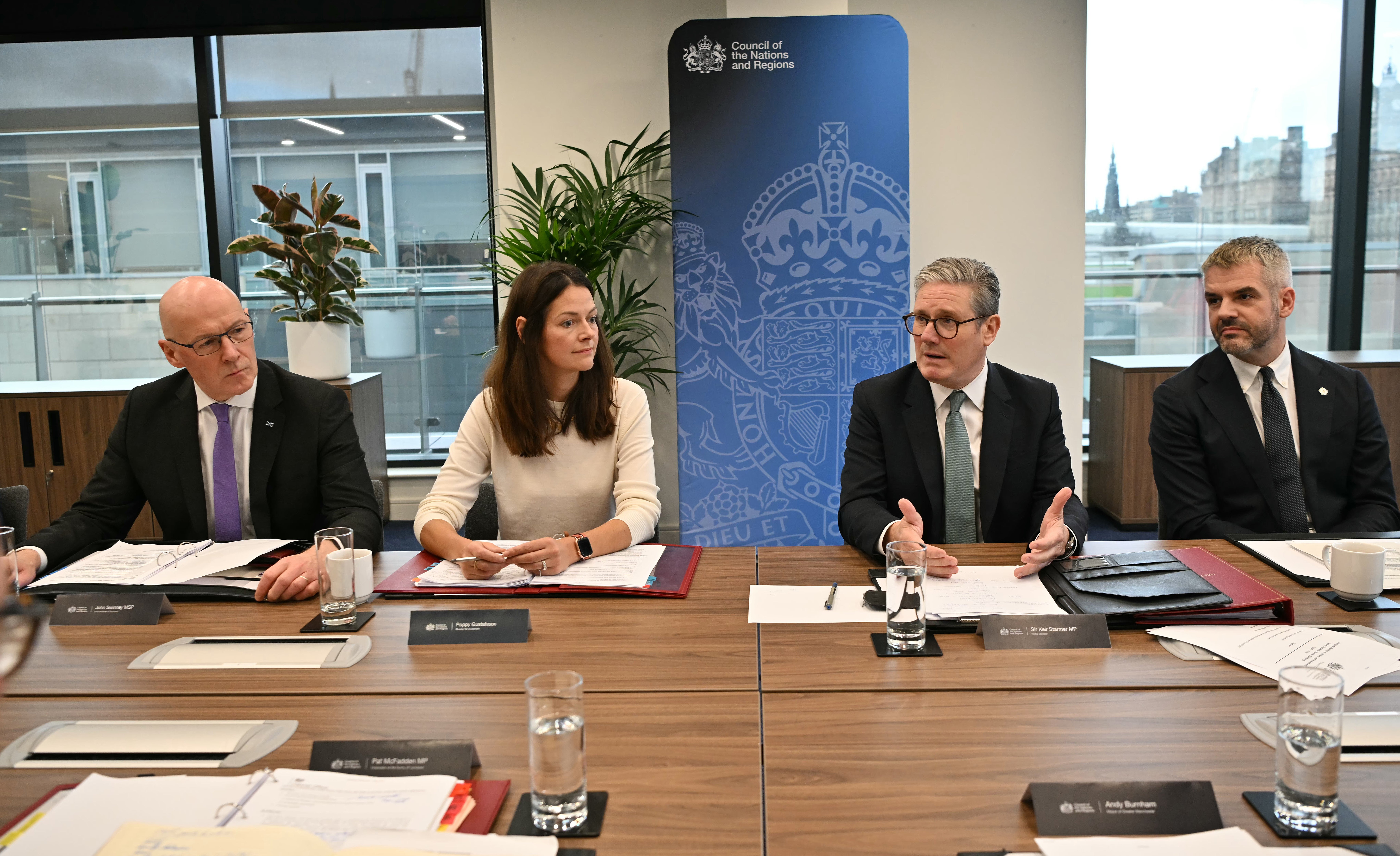How will Starmer’s new Council of the Nations and Regions tackle the challenges of power-sharing?
After years of Westminster’s strained relations with metro mayors and the devolved governments in Cardiff and Edinburgh, a reset is badly needed, writes Sean O’Grady. But will this fresh approach work?


Keir Starmer has proudly chaired a meeting of the latest constitutional innovation in the UK, the Council of the Nations and Regions. Friday’s session in Edinburgh was more or less an introductory one with no executive decisions taken, but all those involved seem to want to make this new arrangement work in as cooperative and productive a manner as possible, given their differing political complexions and, to some extent, regional rivalries and sometimes unresolved issues with Westminster/Whitehall.
Starmer said he wants to “rewire” the way the UK government interacts with devolved areas and brings together first ministers and metro mayors: “The question is not the aspiration, it’s whether we can roll up our sleeves and work together to deliver that growth because that unlocks so much.”
Who is on this new council?
There are 17 “ex officio” members at the moment:
- Prime minister of the United Kingdom (Keir Starmer, Labour)
- First minister and deputy first ministers of Northern Ireland (Michelle O’Neill and Emma Little-Pengelly, Sinn Fein and DUP, respectively)
- First minister of Scotland (John Swinney, SNP)
- First minister of Wales (Eluned Morgan, Labour)
- Mayor of London (Sadiq Khan, Labour)
- Mayor of Cambridgeshire and Peterborough (Nik Johnson, Labour)
- Mayor of the East Midlands (Claire Ward, Labour)
- Mayor of Greater Manchester (Andy Burnham, Labour)
- Mayor of the Liverpool City Region (Steve Rotherham, Labour)
- Mayor of the North East (Kim McGuinness, Labour)
- Mayor of South Yorkshire (Oliver Coppard, Labour)
- Mayor of Teeside (Ben Houchen, Conservative)
- Mayor of the West Midlands (Richard Parker, Labour)
- Mayor of the West of England (Dan Norris, Labour)
- Mayor of West Yorkshire (Tracy Brabin, Labour)
- Mayor of York and North Yorkshire (David Skaith, Labour)
Apologies for absence?
Sue Gray, former chief of staff and now the prime minister’s envoy to the nations and regions. She is taking some time out after the recent ructions in Downing Street.
Is the Council of the Nations and Regions needed?
Yes, on balance. The idea was Gordon Brown’s, who suggested it was a way of managing the UK’s increasingly complex patchwork of “asymmetric devolution”, where various parts of the UK enjoy widely varying degrees of devolved government (or none at all). Differences in legislation can give rise to conflicts with UK law, for example, and suitable political machinery can avoid costly and acrimonious legal disputes. This mostly applies to Scotland, where issues such as trans rights and recycling bottles have had to be resolved, not always satisfactorily for all concerned.

It is also fair to say that London’s relations with Edinburgh and Cardiff have also been strained during the Johnson and Truss premierships, to the point of open mutual contempt. Johnson resented Nicola Sturgeon, semi-privately referring to her as “that bloody Wee Jimmy Krankie woman”. For her part, Truss suggested Sturgeon was best “ignored” and Mark Drakeford, first minister of Wales, was too “low energy” for her tastes. She didn’t even make a courtesy call to them during her brief time in office. Extraordinary.
Who’s in charge?
That too is complicated. Ultimate responsibility now lies with the PM, who is also “minister for the union”. The new Council of the Nations and Regions is being overseen by the Cabinet Office minister Pat McFadden, now appointed minister for intergovernmental relations. However, the centre’s relations with the English metro mayors (who are also members of the council) and all other local authorities are still looked after by Angela Rayner as secretary for local government.
But aren’t there other such devolutionary councils and committees?
Oh yes. The previous elaborate structures, set up in 2022, are still in place and still operational. There is thus still an intergovernmental relations system running with three tiers:
- Top tier: the Prime Minister and Heads of Devolved Governments Council
- Middle tier: The Interministerial Standing Committee, the Finance Interministerial Standing Committee and additional time-limited interministerial committees formed as necessary
- Lowest tier: a number of interministerial groups formed to discuss specific policy areas
There is also a mayoral council for English regional mayors, chaired by Rayner; the British-Irish Council, comprising the Northern Ireland Executive; and the governments of Ireland, Scotland, Wales, the Isle of Man, Jersey and Guernsey.
Is it democratic?
No. Starmer states that those around the table will be “equal voices”, with a view to “solving problems” but of course, they represent radically different populations, from, say, Khan in London (almost 9 million) to Skaith in York and North Yorkshire (818,000). Whole swathes of England are left unrepresented at the new council, and Labour completely dominates it.
Where’s it all heading?
The government wants to push for devolution and larger local authority groupings across England, using increased powers, the attraction of more influence at the centre and extra funding to overcome local resistance. The result would be a more complete (but not comprehensive) system and varied patterns of governance across the country. Labour’s manifesto suggests that in the long term, the council could evolve eventually into a new second chamber for the UK parliament, supplanting the Lords: “Labour is committed to replacing the House of Lords with an alternative second chamber that is more representative of the regions and nations.” A more immediate issue for many local authorities is the imminent threat of bankruptcy.
Join our commenting forum
Join thought-provoking conversations, follow other Independent readers and see their replies
Comments
Bookmark popover
Removed from bookmarks